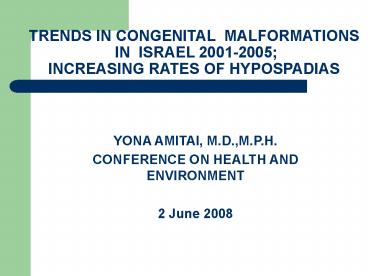TRENDS IN CONGENITAL MALFORMATIONS PowerPoint PPT Presentation
1 / 29
Title: TRENDS IN CONGENITAL MALFORMATIONS
1
TRENDS IN CONGENITAL MALFORMATIONS IN ISRAEL
2001-2005 INCREASING RATES OF HYPOSPADIAS
YONA AMITAI, M.D.,M.P.H. CONFERENCE ON HEALTH AND
ENVIRONMENT 2 June 2008
2
CONGENITAL MALFORMATIONS (CM)
FREQUENCY AND SIGNIFICANCE
- RATE 3 IN THE GENERAL POPULATION
- 5-10 IN NEWBORNS WITH
CONSANGUINITY - ABOUT 4,500 NEWBORNS WITH MAJOR CM
- IN ISRAEL, ANNUALLY
- CONSEQUENCES
- ABORTIONS
- MORBIDITY
- LIFE LONG DISABILITIES
- HUMAN SUFFERING
- COST
3
Congenital Malformations
- Causes
- Genetic/chromosomal
- Environmental
- Incidence
- 2-3 of newborn
- In 40-60 of all birth defects cause is unknown
- Genetic/chromosomal -10-15
- Environmental -10
- Multi-factorial (genetic environmental) -
20-25
4
SPECTRUM STAGES OF MAJOR BIRTH DEFECTS IN
ISRAEL - 2005
- ANNUAL BIRTH COHORT 143,878
- ABORTION IN EARLY PREGNANCY (ABOUT 600)
- LATE ABORTION / STILLBIRTHS (n282)
- DETECTED AT BIRTH, DEFINED LIST (n2,882)
- COMLETENESS, ABOUT 75, CONSISTENTLY
- DETECTED AFTER DISCHARGE FROM HOSPITAL?
5
(No Transcript)
6
(No Transcript)
7
THE EFFECT OF CONSANGUINITY
- CONSANGUINITY RATES IN ISRAEL
- JEWSlt 1
- ARAB CHRISTIANS 20
- MOSLEMS ARABS 40
- BEDUINS 60
8
CONGENITAL ANOMALIES IN ISRAEL 2001-5 IN
DECREASING ORDER
9
(No Transcript)
10
??? ?????? ???? ????? - VSD
- ????? ?? VSD
- ???? ????? ?????
- ????? ????? ??????? ???????
- ????? ????? ????? ?????? ????????? ????? ???????
?????? ?????? ?- US
11
(No Transcript)
12
(No Transcript)
13
(No Transcript)
14
(No Transcript)
15
(No Transcript)
16
(No Transcript)
17
CONGENITAL HEART DISEASES RATES PER 1,000
LIVEBIRTHS
18
CONGENITAL UROGENITAL MALFORMATIONS RATES PER
1,000 LIVEBIRTHS
19
HYPOSPADIAS CRYPTORCHIDISM (TESTICULAR
DYSGENESIS SYNDROME) HYPOTHESIS OF
EBVIRONMENTAL EFFECT
- HYPOSPADIAS
- DEMONSTRATED IN SEVERAL STUDIES
- LINKED WITH EXPOSURE TO PESTICIDES
- HYPOTHESIS
- RELATED TO ANDROGENIC / ESTROGENIC IMBALANCE
- WITHIN THE SPECTRUM OF ENDOCRINE DISRUPTORS
20
(No Transcript)
21
???? ?????? ?????? ???? ?????????? ???? ????,
???? ??? ?????? ???????? 1999-2007
22
Hypospadias rates by system and year of birth
(1968-1995), 3-year moving averages, United
States group. Paulozzi, NCEH, CDCs , EHP 1999
23
Restrepo et al., Scan J Work Environ
Health 16239-46, 1990 Colombia Offspring
8,867 floriculture workers Nested case-control
cryptorchidism (16/222 congenital
malformations) Controls 443 boys Pesticide
exposure Questionnaire OR 1.3 95CI 0.7-2.4
(Cryptorchidism) OR 1.2 95CI 0.6-2.4
(Hypospadias)
24
Kristensen et al., Epidemiology
8537-44,1997 Norway register of newborn
192,417 births Retrospective cohort
cryptorchidism (251) and hypospadias (270)
Pesticide purchase Tractor pesticide spraying
equipment OR 1.70 95 CI 1.16-2.50 (Pesticide
purchase) OR 2.32 95 CI 1.34-4.01 (Vegetable
farming)
25
Weidner et al., Environ Health Perspect
106793-6, 1998 Denmark Register of newborn
malformations Register based case-control
cryptorchidism (6177) and hypospadias (1345)
Controls 23,273 boys Parent occupation in
farming and gardening (year of conception
1983-1992) OR 1.38 95 CI 1.10-1.73 (Mother in
farming/gardening) OR 1.67 95 CI 1.14-2.47
(Mother in gardening)
26
Longnecker, et al. Am J Epidemiol 155313-22,
2002 USA Cohort of newborn 1959-1966 Nested
case-control cryptorchidism (219) and
hypospadias (199) Controls 599 boys
Pesticide measurements DDE in mother blood,
third trimester of pregnancy OR 1.3 95CI
0.7-2.4 (Cryptorchidism) OR 1.2 95CI 0.6-2.4
(Hypospadias)
27
Giordano et al. Rome, Maternal diet
and the risk of hypospadias and cryptorchidism in
the offspring. Paediatr Perinat Epidemiol May
2008
- Male genital tract birth defects have been
associated with several prenatal exposures to
environmental and dietary risk factors. - . A case-control study was conducted in the
Sicilian Province of Ragusa. Cases (n 90) and
controls (n 202) included births in 1998-2002 - Increased ORs were observed for mothers of
children with hypospadias who, during pregnancy,
frequently consumed fish (OR 2.33 95 CI 1.03,
5.31) and fruit (OR 5.10 95 CI 1.31,
19.82). - For cryptorchidism, increased risk was
observed in mothers consuming liver (OR 5.21
95 CI 1.26, 21.50), and smoked products (OR
2.46 95 CI 1.15, 5.29). - For the two malformations pooled together,
increased risk was associated with maternal
consumption of liver (OR 4.38 95 CI 1.34,
14.26) and with frequent consumption of wine (OR
1.98 95 CI 1.01, 3.86). - This study suggests that some maternal
dietary factors may play a role in the
development of congenital defects of the male
reproductive tract. - Further research may be warranted on the
endocrine-disrupting effects resulting from the
bioaccumulation of contaminants (fish, liver),
pesticides (marketed fruit, wine) and/or
potentially toxic food components (smoked
products, wine, liver).
28
??????
- ????? ?? ????? ?????? ?????? ?????? ?? ??????
???? ?????? - ????? ?????? ?????? ??????? ????? ????? NTD
- ????? ????? ?????? ?????? ?????
- ????? ????? ?????? ?? ??? ??? ??? ??????
????-????? (VSD) - ???? ????? ????????, ?????? ?????? ????? ??????
???? ????? ?????? ?? ??? (US) - ????? ????? ??????? ???? ???? ??????????
- ????? ?? ????? ????????, ????? ??? ?????? ???????
????? - ?????? ?? ????? ?????? ?? ?????? ?????? ???????
?????? ???????????, ?????? ????? ??????? ??????
29
(No Transcript)

